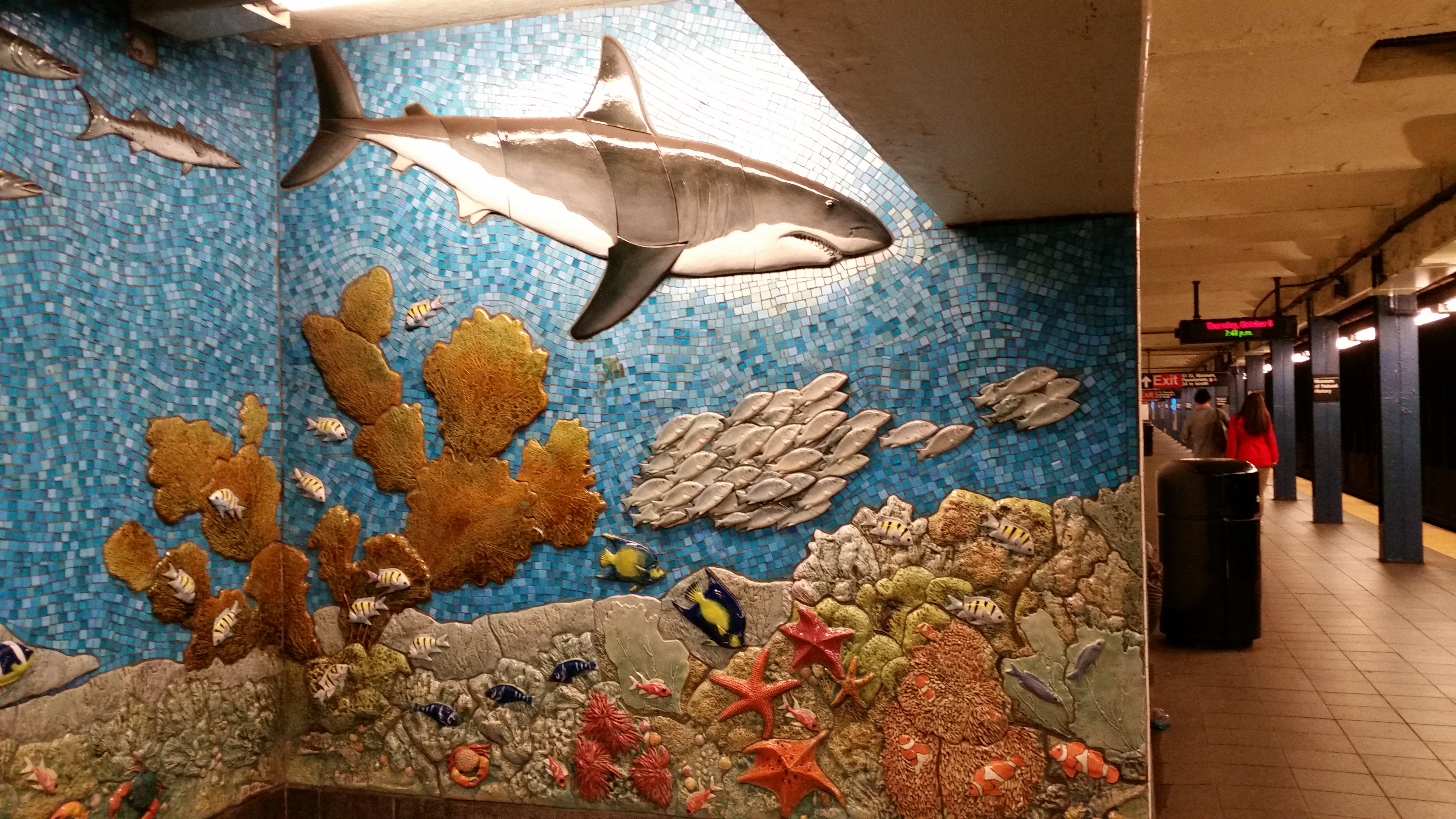The inner lives of fish
If fish feel pain and pleasure, what should we do?
Cici Zhang • November 7, 2016

A harmonious underwater scene in a mural at the 81st Street – Museum of Natural History subway station in New York City. [Image Credit: Cici Zhang]
Bronx, New York City. The hustle of the New Fulton Fish Market starts at 1am — buyers and visitors come to pick boxes and boxes of fresh fishes from all over the world. Brought in by truck or by air from the nearby LaGuardia airport, tons of fish are cut, weighed and sold to customers across the country every day.
Commercial fishermen around the world catch and kill more than 90 million tons of fish and other seafood every year, according to the Food and Agricultural Organization of the United Nations.
Humans don’t worry about this very much, and when we do, it’s usually for self-interested reasons: are we catching so many fish now that there won’t be enough for our children to eat? But author and animal ethicist Jonathan Balcombe thinks we should be considering something else.
Speaking Oct. 7 at the American Museum of Natural History, Balcombe urged his audience to “look at fishes through a different lens,” rather than simply as “a source of food or recreation.” We should do this, he says, because fish may actually feel pain.
Balcombe has a PhD degree in ethology (the study of animal behavior). He has written five books, the latest published in 2016: What a Fish Knows: The Inner Lives of Our Underwater Cousins.
To address his point about fish’s pain, Balcombe cited a 2012 study of zebra fish by British biologist Lynne Sneddon. Sneddon injected zebra fish with pain-causing acid solution or benign saline solution. She then put them in a tank with two open chambers that the fish could freely swim between. One had rocks and vegetation, while the other was barren.
Initially, both groups of fish preferred the chamber with rocks and vegetation, because fish like enriched environments where they can hide and get stimulation. But when researchers dissolved a painkiller into the barren chamber, the acid-injected zebra fishes began to behave differently: they started to swim into the barren chamber. The saline-injected zebra fishes, which “presumably were not in lasting pain,” remained in the enriched chamber, said Balcombe.
It seems that the painkiller suddenly made the barren chamber attractive, but only to fish that were given the acid injection. To Sneddon and Balcombe, it is strong evidence that these zebra fish not only feel pain, but seek pain-relief when given the opportunity.
Some fish also engage in pleasure-seeking behaviors, said Balcombe. For example, cleaner wrasses have a symbiotic relationship with groupers. These wrasses not only remove dead skin and parasites from the much larger fish, but also provide “extra services” like stroking the grouper, in a ritual that appears to be about mutual pleasure. Balcombe explained that the better the wrasses are at providing these extra services, the more their “reputation” improves and the more grouper clients wait in the line. “If you don’t do a good job, clients go somewhere else,” said Balcombe. Fish researchers describe the phenomenon as “image scoring,” said Balcombe, comparing it to “an eBay rating.”
Groupers will also swim to human divers in order to be stroked. “There is no parasite removing involved,” said Balcombe, and they do that “probably because it feels nice.”
So should humans stop eating fish? Balcombe declined to directly answer that question from the audience, explaining that he wasn’t there to preach or point fingers. Instead, he encouraged people to learn more and make their own decisions.
But Balcombe’s message certainly seemed to resonate with one young listener. During a question-and-answer session, a boy standing between his mother’s legs loudly announced his newly gained perspective through the microphone: “I think fishes are smart!”